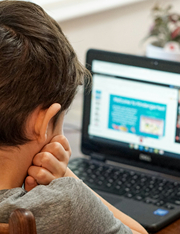How to Prepare Your Child for Online Learning
As online learning becomes more prevalent, many parents are seeking ways to ensure their children are equipped to thrive in this new educational environment. Unlike traditional classrooms, online learning presents unique challenges that require careful preparation.
From creating an optimal workspace to building effective study habits, preparing your child for online education can significantly impact their success.
Maintaining Social Interaction
One common concern about online learning is the lack of face-to-face interaction with peers. To maintain social interaction in online education, Kindergarten can incorporate virtual playdates, group activities, and interactive lessons that encourage young children to engage with their peers. However, with a little effort, it’s possible to ensure your child remains socially connected, even in a virtual learning environment.
- Encourage virtual study groups: Many online schools offer group projects or discussions, which provide opportunities for students to collaborate with their classmates. Encourage your child to participate in virtual study groups or form their own.
- Organize virtual hangouts: Outside of schoolwork, set up video chats or virtual hangouts with friends. This helps your child stay connected socially and prevents feelings of isolation.
Creating a Dedicated Workspace
One of the first and most important steps in preparing your child for online learning is to establish a dedicated workspace. Unlike in-person schooling, where students have designated classrooms, online learning requires a structured space at home that promotes focus and productivity.
- Choose a quiet area: Find a spot in your home where your child can concentrate with minimal distractions. It should be away from high-traffic areas, such as the living room or kitchen, where noise and activity can interrupt learning.
- Ensure proper lighting: Good lighting is essential for maintaining energy and focus. Natural light is best, but if that’s not available, opt for a well-lit room with desk lamps to reduce eye strain.
Establishing a Routine
While online learning offers more flexibility than traditional schooling, it’s still crucial to maintain a consistent daily routine. A routine helps children stay organized, manage their time effectively, and develop strong study habits.
- Set a regular wake-up time: Even though online learning often allows for a more relaxed schedule, having a consistent wake-up time helps your child start the day on the right foot.
- Designate learning hours: Establish specific times during the day for schoolwork. Whether it’s in the morning or afternoon, a regular schedule helps build a sense of discipline and structure.
- Include breaks and physical activity: Breaks are essential for maintaining concentration and preventing burnout. Encourage your child to step away from the screen, stretch, or go outside for fresh air during designated break times.

Familiarizing with Technology
One of the biggest adjustments for students transitioning to online learning is the use of technology. It’s essential to ensure your child is comfortable with the tools and platforms they’ll be using before their online classes begin.
- Practice using the learning platform: Spend time navigating the platform your child will be using, whether it’s Google Classroom, Zoom, or another learning management system (LMS). Teach your child how to log in, submit assignments, and participate in virtual lessons.
- Check technical requirements: Make sure your internet connection is stable, and your devices meet the technical requirements of the online school. Consider investing in a reliable computer and ensuring your child has access to a webcam, microphone, and headphones if needed.
Encouraging Self-Discipline
One of the key challenges of online learning is the level of independence it requires. Without the constant supervision of a teacher, children need to develop self-discipline to stay on top of their schoolwork.
- Set clear expectations: Outline daily or weekly goals for assignments, reading, and study time. Help your child break larger tasks into smaller, manageable steps to avoid feeling overwhelmed.
- Teach time-management strategies: Encourage your child to use tools like planners, to-do lists, or digital calendars to keep track of deadlines and assignments.
- Minimize distractions: During learning hours, limit access to non-school-related websites, games, and social media. You can also use apps like “Focus Booster” or “Forest” to help your child stay focused during study sessions.
Monitoring Progress and Providing Support
As a parent, your involvement in your child’s online learning journey is crucial. However, it’s important to strike a balance between offering support and encouraging independence.
- Regularly check in: Ask your child about their assignments and upcoming projects. Review their progress through the learning platform or any grade portals provided by the school.
- Communicate with teachers: Stay in contact with your child’s teachers to discuss their progress, challenges, and any adjustments that may be needed.
Whether it in a classroom setting or individual tutoring, preparing your child for online learning is a multi-faceted process that requires attention to both their academic and emotional needs. By creating a structured environment, establishing a routine, and encouraging self-discipline, you can help your child thrive in this new mode of learning. Additionally, ensuring they are comfortable with technology and maintaining social connections will contribute to their overall success.







